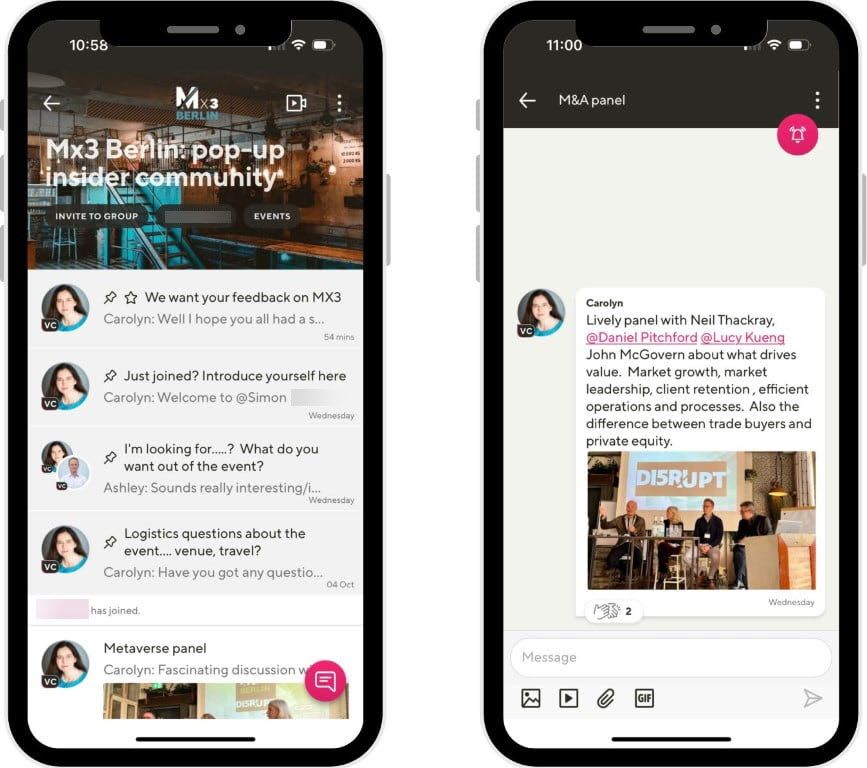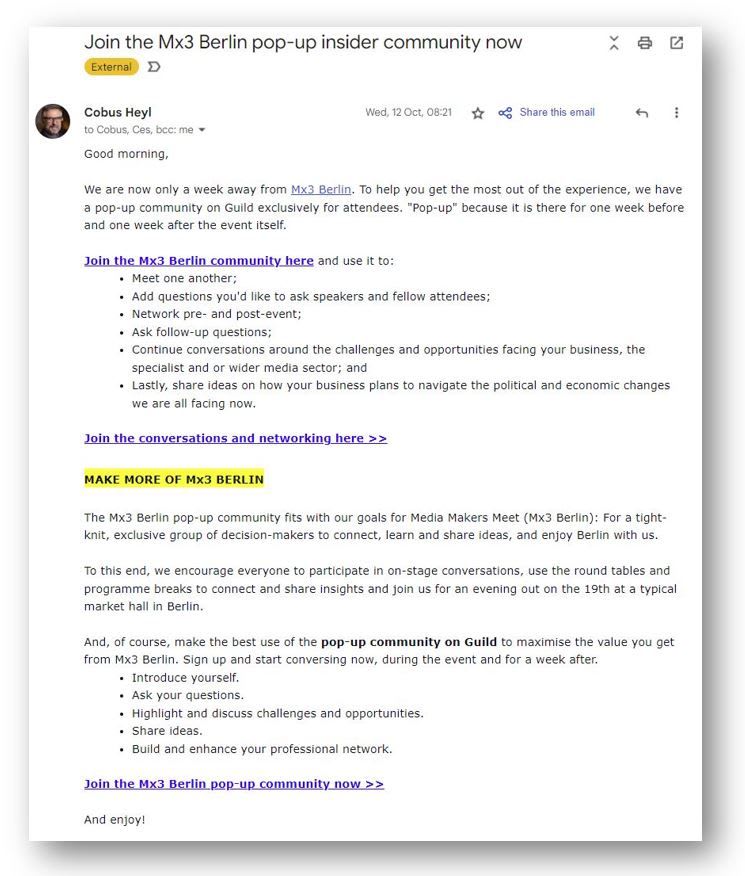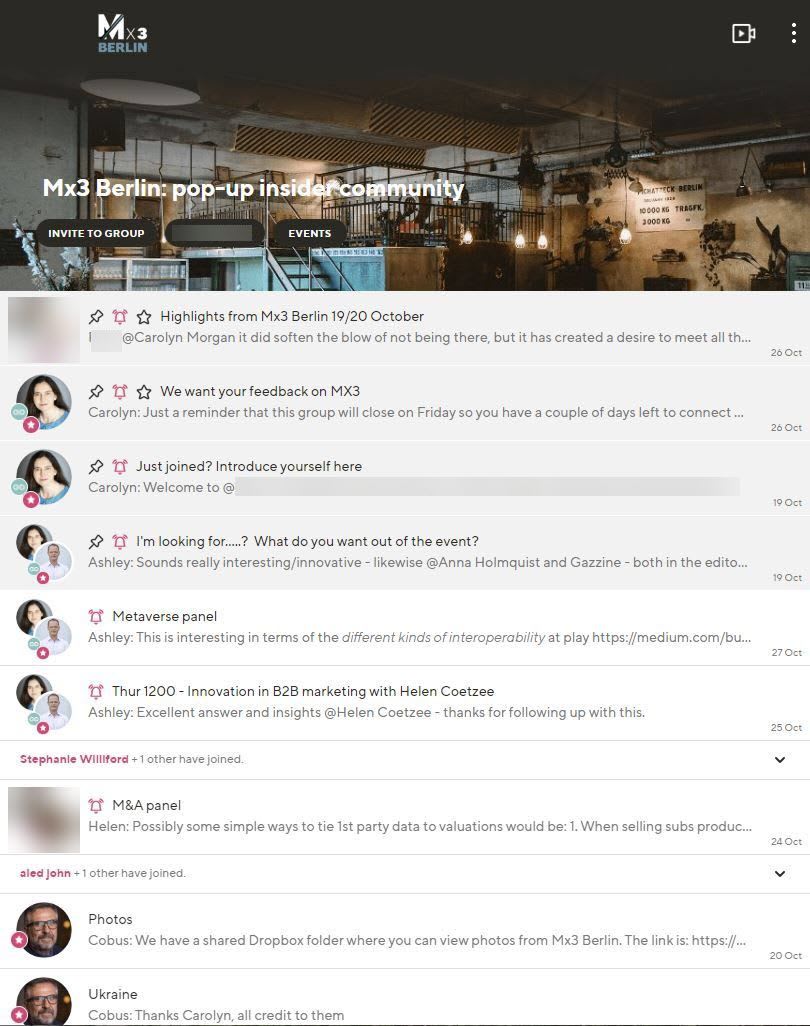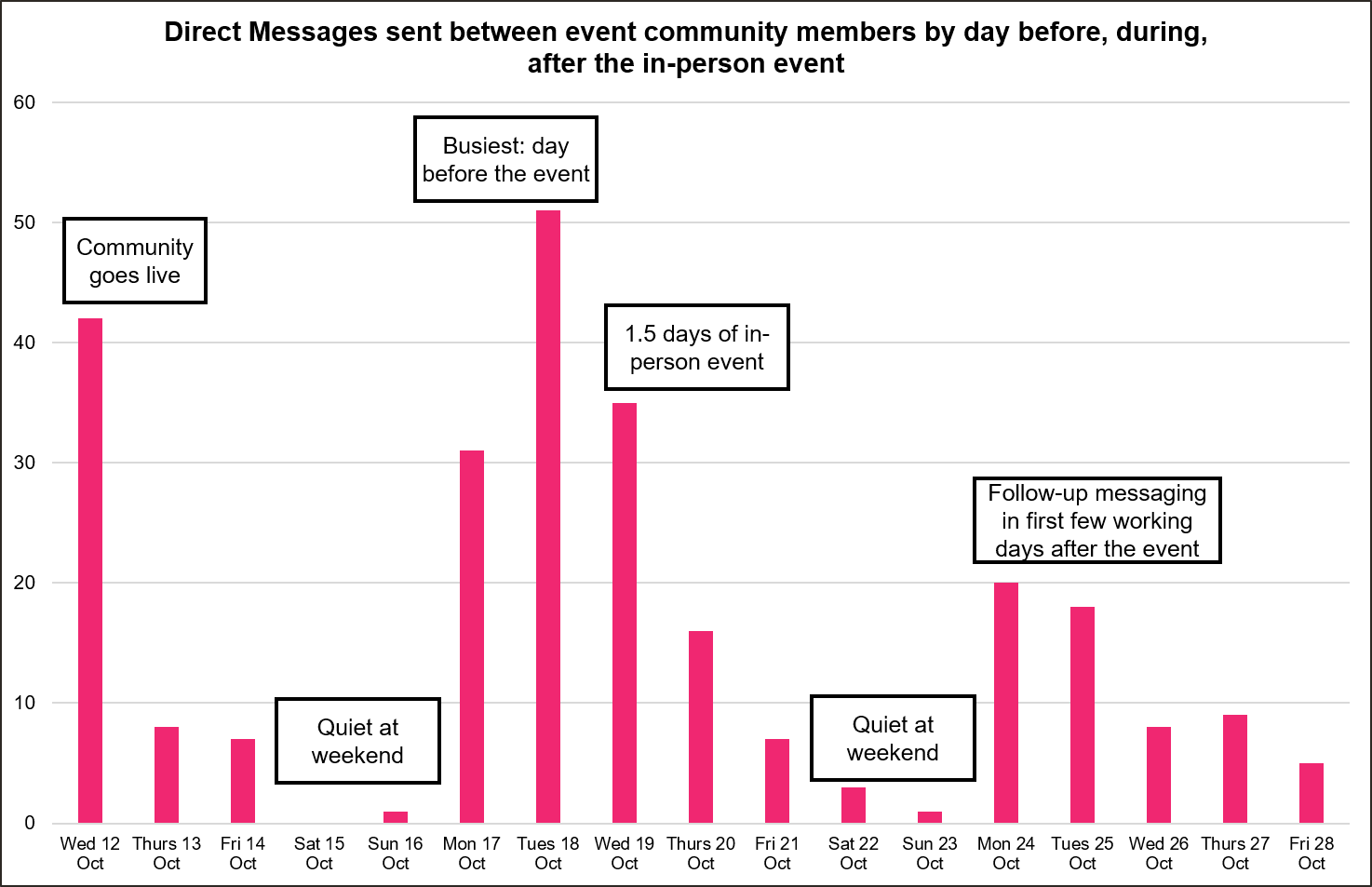What was the idea?
Events can struggle to get community engagement year-round. It also requires resource to run those communities 365 days/year.
So, instead, what if you run a temporary community around the event which is live in the run-up, during, and for a set period after the event and then close it?
What we call a 'pop-up event community'.
Following is what we learned doing just this for the Media Makers Meet (Mx3) Berlin event - a new event organised and hosted by Di5rupt in association with Deutsche Fachpresse (the German Business Media Association).
Cobus Heyl, the event organiser, explains why an intimate community based on conversations and networking fitted so well with the event:
"The whole premise of Mx3 Berlin is that it is a compact event, capped at 100 attendees and more informal/conversational in nature and with a high degree of interaction on the two days of the actual event."

How did it work in practice?
The community was hosted by Cobus and supported by Carolyn Morgan who was also a moderator at the event.
The pop-up community, hosted on Guild, went live 1 week before the event and was closed just over 1 week after the event.
The value of the event, for senior B2B media execs, was as much about networking as content and set in an informal and intimate environment. The online community served to reflect and enhance that and extend the value of the conversations and networking beyond the duration of the in-person event itself.
The email invite to join the community:

Content within the pop-up event community included:
- Pinned conversations for the most common things e.g. new member introductions, what delegates wanted out of the event, practical help with travel or logistics, venue details, agenda and any last-minute updates to it etc.
- Pre-event networking sessions e.g. a video meetup session and the ability to connect with other attendees so you can stay in touch even after the community closes.
- Session-specific threads so members could post questions in advance of the session itself, or ask follow-up questions after the session (there are usually more questions than there are time to answer live)
- Social / experiential threads e.g. sharing photos from the event, sharing details of the post-event social activities
- Summary / wrap-up content after the event with notes from specific sessions and highlights from across the event.

What results did the digital community deliver?
- Of 101 registered attendees, 61 joined the community - a 60% join rate
- 33 group conversation threads with 191 messages (average of 6 messages per conversation)
- 100 new connections made between members of the group (average of 1.6 new connections per member)
- 268 direct messages sent between members of the group (average 4.4 direct messages sent per member)
The chart below shows when the direct messages were sent between members of the online community. You can see the most active periods were the day of launch, the two days before the event, and the first few working days following the event:

What did we learn about how to succeed with a pop-up event community?
- We think the concept works well: it avoids being too resource-intensive in time or cost but adds value to the event experience.
- Networking was extended both before and after the event - we need more benchmark data to know how good the 1.6 new connections per member we achieved really is.
- Engagement before and after the event was also extended - 4.4 direct messages per member shows a good level of 1-1 interaction outside the event itself. We have more insight on when is best to capture the most engagement from attendees outside the event itself.
- Threads in conversations are important - particularly so you can have threads focused around particular sessions at the event. A single stream of chat (like with WhatsApp) would not be structured enough.
- It is important the community host/moderator is also a host/moderator at the event itself - this makes sure there is a genuine connection and alignment between the community and the event.
- Other best practice tips:
- announce a networking video chat on the day the event launches so it is in diaries
- push to encourage all speakers/moderators to join the community and post a thread on their session
- make sure you use session questions submitted via the community at the live event
- email attendees after the event with a link to the community and event summary notes to get more late joiners
Can an online event community increase event attendance?
Event organisers worry that an online community might cannibalise attendance of the event itself.
We have seen no evidence to support this. In fact, quite the contrary. As one delegate said who couldn't attend in person due to illness:
"This community softens the blow of not being there, but it has created a desire to meet all these wonderful people who were there."
Feedback from the event organiser
Cobus Heyl, the event organiser, gave the following feedback:
- "This was the first time we ran a Guild community around an event, and I am very happy with the results, especially given what we wanted this event to be."
- "I saw how the online community could become more ingrained with the overall event experience. As an organiser, the community feels like a much better place to communicate FAQs, updates and reports with attendees pre- and during the event than via email (which I would still have to use, but with much lesser frequency). It also is the right place for getting attendee input, e.g. questions for speakers, ahead of the event. Post-event, it is a good place for sharing take-outs, post-event reports and other content only available to attendees, as well as asking for feedback on the event experience."
- "Something I would have liked for us to drive more ahead of the event is the opportunity for people to connect one-to-one and one-to-many, introducing themselves. I can see how the online community can take the "stress" out of going to an event and trying to network once there, especially when you are new to the event and know no one else there."
Learn more
This article looked at pop-event communities i.e. temporary digital communities centred around an event.
But here's a more detailed summary on how you can combine online communities generally with events to the benefit of both in our best practice guide.
More on publisher, media and subscription communities
12 ways publishers get ROI from community
12 ways membership organisations can get ROI from community
Media Entrepreneur Meetup builds networking community on Guild
Speciall Media builds community of practice for publishers and media owners on Guild
The Marketing Society builds membership community on Guild
Renewd moves from Slack to Guild for its B2B membership community
Join the community for events professionals
The Events 365 community is for event organisers to discuss best practice in your industry. Join 1200+ events professionals to benchmark, inspire, learn, debate, and share your experiences.

Join Guild 🤝
See for yourself how the Guild experience is different to WhatsApp, Slack, LinkedIn or Facebook Groups.
Guild is a safe space to connect, communicate and collaborate with others.
Join us on a platform that is purpose-built for creating groups, communities and networks on mobile.
- Just want to join some groups? Simply join Guild and then look through the discoverable groups and communities to find relevant ones to join
- Thinking of running your own community? With an elegant and simple to use, mobile-first UX you’ve got everything you need to start a community - custom branding, analytics, group and user management and support. Get started with your own community here with our free and paid options
Contact us if you want to know more or have any questions.